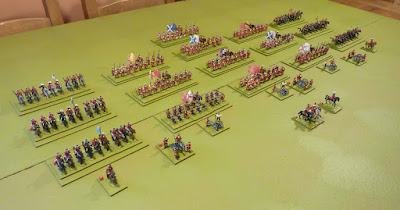As I believe I have related previously, my maternal grandfather lived in Paris when I was a boy. Once, when we visited him during school holidays when I was about 12 or so, he took me and my cousin along to the Musée de l'Armée, one wet Sunday morning when it was officially closed (the curator was a friend of his - he was that sort of a guy), and I was introduced to Napoleon and his soldiers.
Thereafter, he used to send me occasional Napoleon-themed gifts for my birthday and suchlike. There were a few toy soldiers, but he also sent me some books. Throughout my teens, I gradually acquired a series of little paperbacks, in French (my grandfather was keen on self-improvement!), by an author named, apparently, "Erckmann-Chatrian". I had "Le Conscrit", which is the adventures of a young soldier in the campaign of 1813, "Waterloo", which is a sequel set during the 100 Days, and I also had "Le Blocus" (siege of Phalsbourg) and "L'Invasion" (which is about the 1814 Campaign in France).

In fact, Erckmann and Chatrian were two separate men, lifelong friends from the north-east of France, who wrote a great many books together - ranging from horror stories to collections of regional folk-tales from their part of France. They did most of their writing during the 1860s and 1870s, so the Napoleonic books are novels, written long after the events depicted, but were heavily based on interviews the authors held with old soldiers; thus there is a great deal of reported eye-witness detail which I find very interesting. It's also worth noting, maybe, that E-C were frequently in trouble for their provincial views on Republicanism and kindred topics!
By way of personal apology, I have to explain that my mother spent a lot of her childhood in Paris (until her parents fell out...), and to this day she is (in theory, at least) completely bilingual. As a result, I had very reasonable French when I was a kid, certainly by the local standards of Toxteth. With some coercion from my mum, I got through the first two E-C volumes when I was about 14-15, but not, as far as I remember, the others.
Years later I got back into Napoleon through the world of toy soldiers. With my fast-fading grasp of French I made rather heavy weather of my old E-C paperbacks, and they disappeared forever when I was divorced in the 1990s.
However, I do have a little hardback of "The Conscript" and "Waterloo", published in English as a single volume by Collins sometime around 1950, I would estimate. I've decided to revisit it, as part of my Winter reading programme this year - we'll see how this goes. I am notoriously impatient these days!
It is also possible to download most of the works of Erckmann-Chatrian for free from Project Gutenberg, so I'll think about that as well.
The central character of The Conscript and Waterloo is Joseph Bertha, an orphan who lives in Phalsbourg with a Monsieur Goulden, a watchmaker to whom he is apprenticed. Joseph has a rather soppy girlfriend, Catherine, who lives on a smallholding outside the town, with her Aunt. The details of Joseph's private life are pretty slow going at times, though they do contain some interesting details on the etiquette and social attitudes of the day. Though he is a rather weak youth, and is partially lame, Joseph still gets conscripted in 1813 (to the horror of all parties - especially Catherine's aunt) and sent off to fight in Germany. It does make a man of him, let it be said.
The Waterloo story is less vivid to me now, but I'll certainly give it a read. Some of the early parts of this story contain a lot of interesting information about public attitudes to the return of the Bourbons in 1814, not to mention the arrival of Bonaparte shortly afterwards. Society seems to have split into Old Soldiers vs Everyone Else.
As in most historical fiction, the central character is invariably suspiciously close to the key events in the great battles, but I have to say I found some things I hadn't seen before.
If you are familiar with these books, then I have little to tell you about them. If you are not, then Erckmann and Chatrian themselves are worth reading about, and their recorded eye-witness tales of Napoleon's campaigns, hand-polished or not, are certainly worth a look.
















.jpg)




